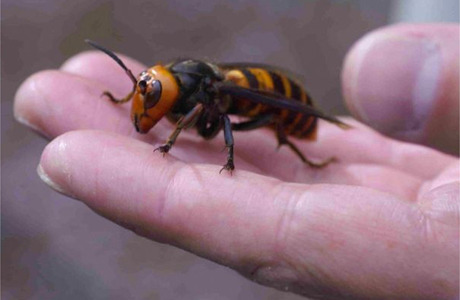By "giant hornet", you mean the Asian giant hornet (
Vespa mandarinia), right?

For those of you not familiar with it, this is the world's largest hornet, measuring over an inch and a half long with a wingspan of 2–3 inches. The Japanese subspecies (
V. m. japonica) is probably the most popularly known. While its venom is not the most potent of any insect, it is agonizingly painful and can literally dissolve flesh. :blink: (It's worth mentioning, however, that the chemical responsible for this oft-cited quality of giant hornet venom is actually common to bee and wasp venoms, even that of the honeybee. It's the sheer amount of venom the hornet injects, and a failure to get treatment for it, that causes notable necrosis.) The good news is that as long as you're not allergic, the giant hornet's sting is usually not fatal, and like most stinging insects, it is unlikely to attack you in the first place as long as it is left alone.
What these hornets are really deadly to is other insects, including introduced European honeybees, which are not adapted to defend themselves against these hornets. It would seem that their stingers have trouble penetrating the hornets' thick exoskeletons. Apparently just one of these hornets can kill 30 to 40 honeybees a minute, decapitating them or stinging them to death. A hunting party of less than three dozen can completely wipe out a hive of 30,000 honeybees in a matter of hours (For an impressiveóif somewhat melodramaticóvideo, look
here). The native Japanese honeybees, however, have a novel method of defending themselves against these marauders: when a scout discovers their hive, the bees swarm around it, vibrating their muscles to generate enough heat to literally cook the hornet to death, so that it never reveals the location of their hive to other hornets (video
here).
Africanized honeybees, or "killer bees" are a hybrid of European and African honeybee subspecies (
Apis mellifera). Their stings are no more deadly than those of normal honeybees, but they live in far larger swarms and are much more aggressive: quicker to attack and slower to give up a chase. These behavioral traits that make them more dangerous to humans, but unless their attacking swarms can create enough heat to kill a Japanese giant hornet, or are more likely to find chinks in the hornet's armor, I don't see how an attacking swarm of these hornets would have any more trouble with them than they would with European honeybees. (That's assuming you're talking about a swarm-to-swarm battle. A one-on-one between a killer bee and a giant hornet would be laughably one-sided, like pitting a red-bellied piranha against a bull shark.)
Sources:
http://news.nationalgeographic.com/news/20...antHornets.htmlhttp://everything2.com/title/Asian+giant+hornethttp://www.wild-facts.com/2011/wild-fact-6...n-giant-hornet/